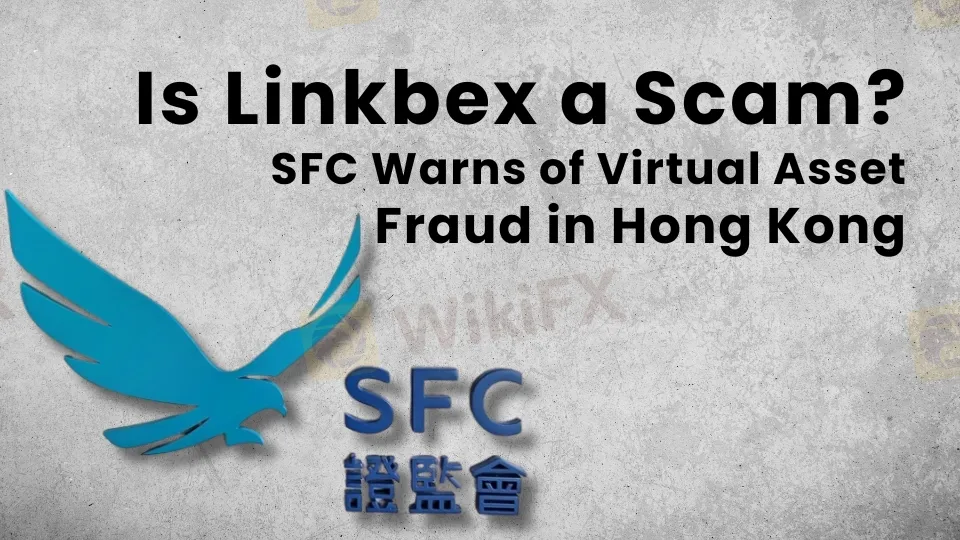简体中文
繁體中文
English
Pусский
日本語
ภาษาไทย
Tiếng Việt
Bahasa Indonesia
Español
हिन्दी
Filippiiniläinen
Français
Deutsch
Português
Türkçe
한국어
العربية
Is Linkbex a Scam? SFC Warns of Virtual Asset Fraud in Hong Kong
Abstract:Hong Kong SFC warns against Linkbex for virtual asset fraud. Learn about false claims, locked accounts, and how to stay safe from investment scams.

On March 06, 2025, the Hong Kong Securities and Futures Commission (SFC) raised a red flag about Linkbex, an entity now under scrutiny for suspected virtual asset fraud. This warning isn‘t just a routine notice—it’s a wake-up call for investors asking, “Is Linkbex legit?” The answer seems to lean heavily toward no.
Linkbex allegedly misrepresented itself, claiming ties to seven SFC-licensed corporations in Hong Kong. That‘s a bold lie, and it didn’t stop there. Investors have reported their accounts being locked, with Linkbex citing an “anti-money laundering investigation of the SFC” as the excuse. It‘s the kind of move that screams scam, leaving people unable to access their funds and wondering what’s next

The SFC didn‘t sit idly by. At their urging, the Hong Kong Police Force stepped in to block the Linkbex website, cutting off one avenue of potential harm. The platform and its site now sit on the SFC’s Suspicious Virtual Asset Trading Platforms Alert List, a public blacklist updated the same day. Its a clear signal: steer clear.
This isn‘t an isolated incident—online investment scams are a growing threat, often cloaked as legitimate virtual asset opportunities. The SFC urges the public to double-check announcements on its official site, especially when accounts get frozen or shady excuses pile up. Losses can hit hard, and fraudsters don’t care about the asset type or channel they exploit.
So, is Linkbex legit? With fake affiliations, locked accounts, and a blocked site, the evidence paints a grim picture. Investors stay sharp—vigilance might just save your portfolio.

Disclaimer:
The views in this article only represent the author's personal views, and do not constitute investment advice on this platform. This platform does not guarantee the accuracy, completeness and timeliness of the information in the article, and will not be liable for any loss caused by the use of or reliance on the information in the article.
Read more

Thinking of Investing? Read Must-Know Facts About Funding pips!
When you check the internet for Funding Pips, you'd be surprised to know it's filled with praise for Funding Pips but often lacks the real facts that traders need. Everything that seems too good to be true should always be verified first. It could be Fraud . So, we conducted research and collected several facts you must know about Funding Pips.

OctaFX Back in News: ED Attaches Assets Worth INR 134 Cr in Forex Scam Case
The Enforcement Directorate (ED) in Mumbai has attached assets worth around INR 131.45 crore. This included a luxury yacht and residential properties in Spain. Read this interesting story.

Oil Prices Stay Firm on Solid US Jobs Data
Oil prices stayed firm this week as the US labour department posted a better-than-expected payroll data in June 2025. Read this news in detail.

Truth About Angel One – Here’s What You Need to Know
Thinking about investing in Angel One? Wait! Know the essential things about the broker before Invest. It could be SCAM. Read, think, and invest .
WikiFX Broker
Latest News
CFD Brokers Face Dual Compliance Pressures Ahead of 2026: Australia and EU Tighten Rules
Services Surveys Signal 'Expansion' In June, Inflation Fears Remain High
Major Risks Associated with AuxiliumFX: You Need to Know
ASIC cancels AFS licences of Ipraxis and Downunder Insurance Services
CFI Financial Group Becomes Official Online Trading Partner of Etihad Arena
FxPro to Launch Crypto Trading Desk, Deepening Digital Asset Push
Global Brokers Vs. Indian Rules: Why They Struggle in India
Discover 5 Benefits of Trading with Trive FX Broker
Indian regulator bars U.S. firm Jane Street from accessing securities market, impounds $566 million in manipulation probe
Asia-Pacific markets trade mixed ahead of Trump's deadline for higher tariffs
Currency Calculator


